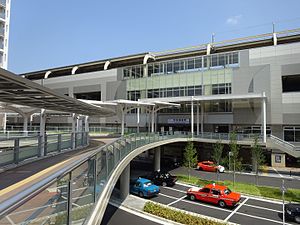Keikyū Kamata Station
KK11 Keikyū Kamata Station 京急蒲田駅 | ||||||||||||||||||||||||||||||||||||||||||||
|---|---|---|---|---|---|---|---|---|---|---|---|---|---|---|---|---|---|---|---|---|---|---|---|---|---|---|---|---|---|---|---|---|---|---|---|---|---|---|---|---|---|---|---|---|
 Keikyu Kamata Station Entrance | ||||||||||||||||||||||||||||||||||||||||||||
| General information | ||||||||||||||||||||||||||||||||||||||||||||
| Location | 4-50-10 Kamata, Ōta, Tokyo (大田区蒲田4-50-10) Japan | |||||||||||||||||||||||||||||||||||||||||||
| Operated by | Keikyu | |||||||||||||||||||||||||||||||||||||||||||
| Line(s) | ||||||||||||||||||||||||||||||||||||||||||||
| Other information | ||||||||||||||||||||||||||||||||||||||||||||
| Station code | KK11 | |||||||||||||||||||||||||||||||||||||||||||
| History | ||||||||||||||||||||||||||||||||||||||||||||
| Opened | 1 February 1901 | |||||||||||||||||||||||||||||||||||||||||||
| Rebuilt | 2012 | |||||||||||||||||||||||||||||||||||||||||||
| Previous names | Kamata; Keihin Kamata (until 1987) | |||||||||||||||||||||||||||||||||||||||||||
| Passengers | ||||||||||||||||||||||||||||||||||||||||||||
| FY2017[1] | 61,746 daily | |||||||||||||||||||||||||||||||||||||||||||
| Services | ||||||||||||||||||||||||||||||||||||||||||||
| ||||||||||||||||||||||||||||||||||||||||||||
Keikyū Kamata Station (京急蒲田駅, Keikyū Kamata-eki) is a railway station in Ōta, Tokyo, Japan, operated by the private railway company Keikyu.
Lines
[edit]Keikyu Kamata Station is served by the Keikyu Main Line and Keikyu Airport Line.
This station is a reversing station for direct train services between Yokohama Station and Haneda Airport.
Station layout
[edit]As of 21 October 2012, the station structure has three levels. Up trains (to Shinagawa and Haneda Airport) depart from the second level, down trains (to Yokohama and Misakiguchi) and Haneda Airport depart from the third level.
Platforms
[edit]The 3rd floor consists of one large platform serving three tracks in a unique configuration. Platforms 1 and 4 are equipped with platform screen doors.[2]
3rd floor
[edit]| 1 | KK Keikyū Main Line | for Yokohama, Kanazawa-Hakkei, Horinouchi, and Uraga KK Keikyū Zushi Line for Zushi·Hayama KK Keikyū Kurihama Line for Keikyū Kurihama |
| KK Keikyū Airport Line | for Haneda Airport Terminal 1·2 (From Shinagawa) | |
| 2 | KK Keikyū Main Line (Local service) | for Yokohama, Kanazawa-Hakkei, and Uraga KK Keikyū Zushi Line for Zushi·Hayama |
| 3 | KK Keikyū Main Line | for Yokohama, Kanazawa-Hakkei, Horinouchi, and Uraga KK Keikyū Zushi Line for Zushi·Hayama KK Keikyū Kurihama Line for Misakiguchi |
2nd floor
[edit]| 4 | KK Keikyu Main Line | for Shinagawa and Sengakuji A Toei Asakusa Line for Shimbashi and Oshiage KS Keisei Oshiage Line for Aoto KS Keisei Main Line for Keisei-Narita and Narita Airport HS Hokusō Line for Imba Nihon-idai KS Narita Sky Access Line for Narita Airport |
| KK Keikyu Airport Line | for Haneda Airport Terminal 1·2 (From Zushi·Hayama and Yokohama) | |
| 5 | KK Keikyu Main Line (Local service) | for Shinagawa |
| 6 | KK Keikyu Main Line | for Shinagawa and Sengakuji A Toei Asakusa Line for Shimbashi and Oshiage KS Keisei Oshiage Line for Aoto KS Keisei Main Line for Keisei-Narita and Narita Airport HS Hokusō Line for Imba Nihon-idai KS Narita Sky Access Line for Narita Airport |
History
[edit]The station opened on 1 February 1901 as Kamata Station (蒲田駅).[3] The Airport Line (then called the Haneda Branch Line) was opened in 1902. Kamata Station was renamed Keihin Kamata Station (京浜蒲田駅) in November 1925, and again renamed Keikyū Kamata Station, the present name, on 1 June 1987.[3]
In 1995, the platforms were extended to accommodate longer 12-car trains.[4]
The station was rebuilt over a period of 12 years from December 2000 to October 2012 with the original ground-level tracks elevated to provide additional track capacity and eliminate road congestion on the three level crossings immediately adjacent to the station.[5] As a result, the project won the Good Design Award presented by the Japan Institute of Design Promotion.[6]
Keikyu introduced station numbering to its stations on 21 October 2010; Keikyū Kamata was assigned station number KK11.[7]
Future plans
[edit]Plans exist to extend the Tokyu Tamagawa Line from Kamata Station eastward by approximately 800 m to Keikyu Kamata Station. This would provide an interchange between the lines, improving accessibility to Tokyo's Haneda Airport ahead of the 2020 Summer Olympics.[8] These plans never materialized before the Olympics. As of June 2022[update], Ōta Ward has agreed with the Tokyo Metropolitan Government to pay 70% of the project cost of ¥136 billion (2021) (US$1.24 billion) while having the city government responsible for the remaining 30%.[9]
Surrounding area
[edit]- Ota Ward Office
- Kamata Station (JR Keihin-Tohoku Line)
- PiO (Plaza Industry Ota)
- National Route 15
Gallery
[edit]-
Station name sign in 2021
-
West exit in 2016
-
East exit in 2016
-
Ticket faregate area in 2016
-
2nd-floor platforms in 2021 (Platforms 4 thru 6)
-
3rd-floor platforms in 2021 (Platforms 1 thru 3)
References
[edit]- ^ Tokyo statistical yearbook 2017. Retrieved on 4 June 2020. (in Japanese)
- ^ "京急蒲田駅にホームドアを設置します". Keikyu.co.jp (in Japanese). February 25, 2019. Retrieved June 4, 2020.
- ^ a b Terada, Hirokazu (July 2002). データブック日本の私鉄 [Databook: Japan's Private Railways]. Japan: Neko Publishing. p. 210. ISBN 4-87366-874-3.
- ^ "京急、24日ダイヤ改正" [Keikyu Railways 24th Timetable Revision]. Kotsu Shimbun. July 11, 1995. p. 1.
- ^ 京急蒲田駅付近の上下線が全線高架化 [Both up and down lines elevated around Keikyu Kamata Station]. Japan Railfan Magazine (in Japanese). Vol. 53, no. 621. Japan: Koyusha Co., Ltd. January 2013. pp. 60–61.
- ^ "Grade-Separated Crossings of Railroads". g-mark.org. November 1, 2012. Retrieved March 4, 2021.
- ^ "京急線全駅にて駅ナンバリングを開始します" [Station numbering will be introduced to all stations on the Keikyu Line]. KEIKYU WEB. 25 June 2010. Archived from the original on 21 February 2014. Retrieved 27 February 2023.
- ^ "Rail extension eyed to boost Haneda accessibility". The Japan Times. Japan: The Japan Times Ltd. 29 July 2014. p. 7. Retrieved 29 July 2014.
- ^ "蒲田駅と京急蒲田駅を結ぶ鉄道の事業化に前進 東京 大田区|NHK 首都圏のニュース" [Advance to commercialization of railway connecting Kamata Station and Keikyu Kamata Station Ota-ku, Tokyo]. NHK Web (in Japanese). 6 June 2022. Retrieved 6 June 2022.
External links
[edit]- Keikyu Kamata Station information (Keikyu) (in Japanese)







